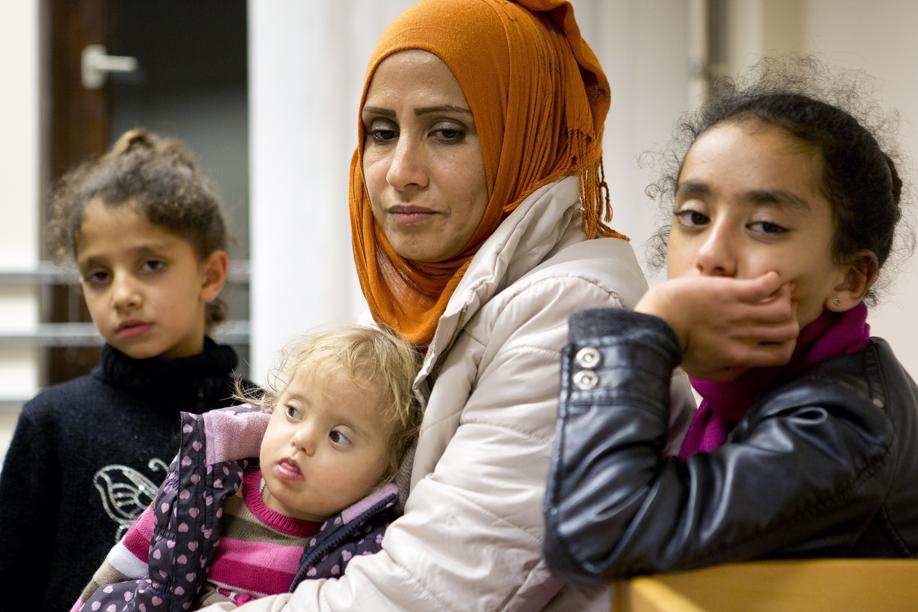
BERLIN — One Syrian woman who joined the stream of migrants to Germany was forced to pay down her husband’s debt to smugglers by making herself available for sex on the way. Another was beaten unconscious by a Hungarian prison guard after refusing his advances.
A third, a former makeup artist, dressed as a boy and stopped washing to ward off men in her group of refugees. Now in an emergency shelter in Berlin, she still sleeps in her clothes and, like several women here, pushes a cupboard in front of her door at night.
“There is no lock or key or anything,’’ said Esraa al-Horani, the makeup artist and one of the few women here not afraid to give her name. She has been lucky, Horani said: “I’ve only been beaten and robbed.’’
War and violence at home, exploitative smugglers and perilous seas along the way, an uncertain welcome and future on a foreign continent — these are some of the risks faced by tens of thousands of migrants who continue to make their way to Europe from the Middle East and beyond. But at each step of the way, the dangers are amplified for women.
Interviews with dozens of migrants, social workers, and psychologists caring for traumatized new arrivals across Germany suggest that the current mass migration has been accompanied by a surge of violence against women. From forced marriages and sex trafficking to domestic abuse, women report violence from fellow refugees, smugglers, male family members, and European police officers. There are no reliable statistics for sexual and other abuse of female refugees.
Among the more than 1 million migrants who have entered Europe over the past year, fleeing war and poverty in the Middle East and beyond, men outnumber women by more than 3 to 1, UN statistics show. “The men dominate, numerically and otherwise,’’ says Heike Rabe, a gender expert at the German Institute for Human Rights.
Susanne Hohne, the lead psychotherapist at a center in west Berlin specializing in treating traumatized female migrants, says that almost all of the 44 women in her care — some barely adults, some over 60 — have experienced sexual violence. Her 18 staff members provide two weekly therapy sessions to each woman and up to seven hours of social work, including home visits, to help with adjusting to life in Germany.
Germany, where an asylum system struggling with accommodating close to 1 million migrants in 2015, has been cutting corners on basic protections for women, like lockable bedrooms and washrooms.
“The priority has been to avoid homelessness,’’ said Rabe, the German expert on gender-based violence. “But an environment that inadvertently facilitates violence is a risk factor. We cannot allow standards to slip.’’
That is easier said than done, said Jan Schebaum, who manages two homes for asylum seekers in east Berlin. There are two bathrooms per floor, and the rooms are full.
One of the homes he runs is the emergency shelter where Horani, the makeup artist, stays. Of 120 adults there 80 are men.
“The women are in the shadow of the men,’’ Schebaum said. “Their voices are drowned out, and it’s a problem.’’
At the food counter, where volunteers hand out hot soup and fresh fruit, the women are often last in line. They stay in their rooms a lot and rarely sign up for activities advertised on the notice board, like museum visits or concerts. One Syrian woman has not left the building since arriving two months ago because her husband, who has not yet arrived in Germany, prohibited her from doing so.
One afternoon a week, female social workers take migrant women to a cafe across the street for a “coffee hour.’’ The walls are covered in graffiti, and it smells of smoke. But no matter. When Horani arrived with a large Arabic music selection on her smartphone, the scruffy interior was transformed into a bobbing sea of dancing head scarves.
As some women painted their hands with henna and others traded frustrations about the time it was taking to get refugee status, Samar, a 35-year-old former employee of the Syrian Finance Ministry opened up about the particular stress of being a woman on the move. Bombed out of her home in Darayya, a suburb of Damascus that early in the civil war became known for antigovernment protests, Samar spent 14 months on the road alone with her three daughters, ages 2, 8 and 13.
“I did not leave them out of my sight for one minute,’’ she said in Arabic, speaking through an interpreter. She and other single mothers slept in shifts along the way, watching over their daughters and one another.
But in Izmir, Turkey, about to board a boat to Greece, Samar was robbed and left with no money to pay the smuggler. A stocky man who called himself Omar, he offered to take her for free, but only if she had sex with him. Samar had heard him before, at night, in the hostel where she and other refugee women were staying, “going to this room and that.’’
But she refused, and Samar stayed in Turkey for almost a year to work and save up the 4,000 euros needed for the remainder of the journey.
“Everybody knows there are two ways of paying the smugglers,’’ she said. “With money or with your body.’’


 PREVIOUS ARTICLE
PREVIOUS ARTICLE